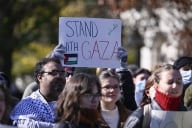You have /5 articles left.
Sign up for a free account or log in.
To the Editor:
Rebecca Cypess’ own ideological and ahistorical “Ideologically Driven Scholar Activism Contributes to Campus Activism” (Dec. 13, 2023) demands a response from a historian who has been part of universities since 1967, and who is an American Jew. I attended college when Jewish as well as Catholic, Black, Latinx, Asian and gender quotas had only recently been eliminated. I confronted active antisemitism in universities that at one point threatened my career.
Writing with understandable outrage, Cypess simplifies a very difficult and often contradictory set of circumstances as she cherry-picks.
I ask Ms. Cypess and readers to consider this:
- Scholar activism in its diverse forms is as old as colleges and universities themselves. It has been central to American universities since the 1890s and led to formal codes of free speech and academic freedom. Among the major episodes, now forgotten, was the Stanford family’s orders to fire the prominent political economist E.A. Ross for his progressive political stances.
- Scholar activism is absolutely central to the necessarily intellectual, cultural, and political lives of universities for faculty, students, administrators, and our multiple publics. Would she object to support for Progressivism in the late 19th and early 20th century? Welfare reform in the 1930s? Civil rights from the 1950s through the present? Anti-war movements? Free speech and reasoned controversies? They are inescapable in genuine higher education.
- Cypess endorses a historically, intellectually, and logically false distinction between “scholar activist” and “ordinary scholars” that her own activist position contradicts. Consider her conflation of distinct issues and lack of attention to historical chance and contexts.
- Scholar activism—in support of an ideology of which Cypess surely approves—was among the factors central to the half century battle for the elimination of quotas for Jewish and other students.
- In other words, it is unscholarly to brand all that one does not like as “ideological.” That is biased, unfair, and itself dangerously ideological. I refer Cypess and others to my own essay, “The best scholarship is political but with no ideological stamp,” Times Higher Education, July 26, 2022
I urge a historical perspective with recognition of controversy and conflict.
I ask writers like Cypess not to cherry-pick examples so selectively and one-sidedly. I ask for close reading of supposed “calls for genocide” and admission that they exist on all sides, not only one side. Scholars must recognize complexity.
I ask all commentators to remember their first year English, rhetoric, and philosophy courses when responding to political rhetoric and distinct forms of expression. We must read carefully and thoughtfully the few expressions of rights of Palestinians for peace and safety in a free land of their own—“from the river to the mountain”—rather than immediately declare them to be calls for the literal abolition of Israel as an independent state and genocide for Israelis or Jews (these are not the same). What about “from sea to shining sea.” In other words, we must be scholars ourselves regardless of our differences in points of view.
Similarly, calling for an “Intifada” is a call for an uprising, not for genocide or elimination of Israel or any other entity.
I ask scholars to be scholarly and professors to be professorial. I ask scholars and professors to lead intellectually. Am I asking too much in 2023? I end by referring professor of music Rebecca Cypess and readers to my “Speaking out on the Israel-Hamas conflict doesn’t mean taking sides,” Times Higher Education, Nov. 29, 2023.
--Harvey Graff
Ohio Eminent Scholar in Literacy Studies & professor emeritus of English and history
Ohio State University





